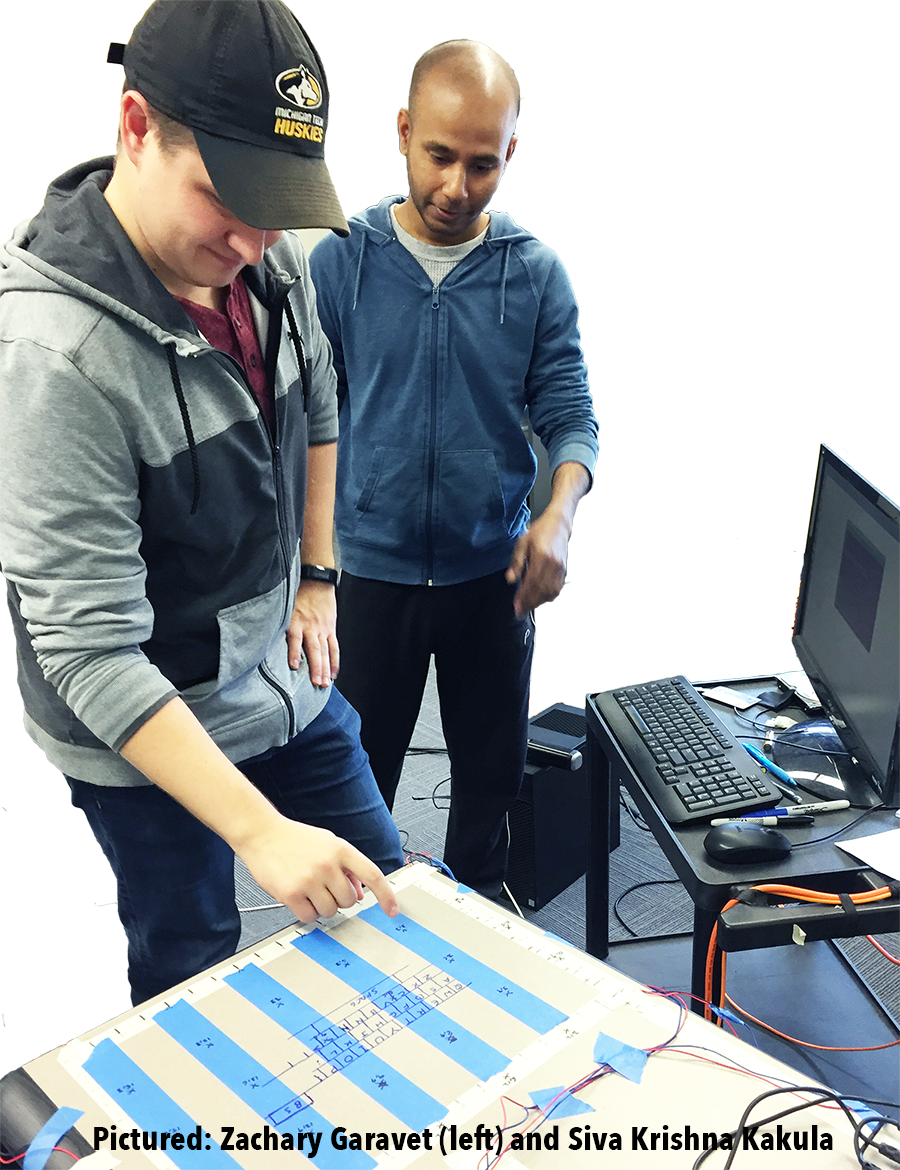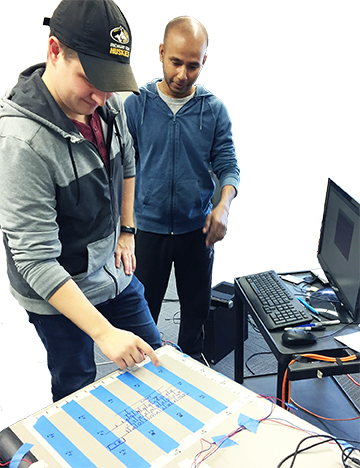

Keith Vertanen, assistant professor of computer science (HCC), and Scott Kuhl (HCC), associate professor of computer science, are principal investigators of a recently funded three-year National Science Foundation grant for their project, “CHS: Small: Rich Surface Interaction for Augmented Environments.” The expected funding over three years is $499,552.00.
Vertanen and Kuhl are members of Michigan Tech’s Institute of Computing and Cybersystems (ICC) Center for Human-Centered Computing. A 2018 ICC research seed grant funded by ECE Alumnus Paul Williams was used to produce some of the preliminary results in the successful proposal. More info about the Williams Seed Grant can be found here: https://blogs.mtu.edu/icc/2019/07/16/appropriating-everyday-surfaces-for-tap-interaction/.
A related video can be found here: https://youtu.be/sF7aeXMfsIQ.
Abstract: Virtual Reality (VR) and Augmented Reality (AR) head-mounted displays are increasingly being used in different computing related activities such as data visualization, education, and training. Currently, VR and AR devices lack efficient and ergonomic ways to perform common desktop interactions such as pointing-and-clicking and entering text. The goal of this project is to transform flat, everyday surfaces into a rich interactive surface. For example, a desk or a wall could be transformed into a virtual keyboard. Flat surfaces afford not only haptic feedback, but also provide ergonomic advantages by providing a place to rest your arms. This project will develop a system where microphones are placed on surfaces to enable the sensing of when and where a tap has occurred. Further, the system aims to differentiate different types of touch interactions such as tapping with a fingernail, tapping with a finger pad, or making short swipe gestures.
This project will investigate different machine learning algorithms for producing a continuous coordinate for taps on a surface along with associated error bars. Using the confidence of sensed taps, the project will investigate ways to intelligently inform aspects of the user interface, e.g. guiding the autocorrection algorithm of a virtual keyboard decoder. Initially, the project will investigate sensing via an array of surface-mounted microphones and design “surface algorithms” to determine and compare the location accuracy of the finger taps on the virtual keyboard. These algorithms will experiment with different models including existing time-of-flight model, a new model based on Gaussian Process Regression, and a baseline of classification using support vector machines. For all models, the project will investigate the impact of the amount of training data from other users, and varying the amount of adaptation data from the target user. The project will compare surface microphones with approaches utilizing cameras and wrist-based inertial sensors. The project will generate human-factors results on the accuracy, user preference, and ergonomics of interacting midair versus on a rigid surface. By examining different sensors, input surfaces, and interface designs, the project will map the design space for future AR and VR interactive systems. The project will disseminate software and data allowing others to outfit tables or walls with microphones to enable rich interactive experiences.

Researchers
Scott Kuhl (Associate Professor, CS)
Keith Vertanen (Assistant Professor, CS)
Amount of Support: $44,000
What if an everyday surface, like a table, could be transformed into a rich, interactive surface that can remotely operate things like computers, entertainment systems, and home appliances?
That’s what Michigan Tech Institute of Computing and Cybersystems (ICC) researchers Keith Vertanen and Scott Kuhl set out to do with a $44K seed grant from Electrical and Computer Engineering alumnus Paul Williams ’61.
Vertanen, assistant professor of computer science, and Kuhl, associate professor of computer science, are members of the ICC’s Center for Human-Centered Computing, which integrates art, people, design, technology, and human experience in the research of multiple areas of human-centered computing. They were assisted in this research by PhD candidate Siva Krishna Kakula, Computer Science, and undergraduate Zachary Garavet, Computer Engineering.
The team’s research goals were threefold: to create machine learning models that can precisely locate a user’s taps on a surface using only an array of inexpensive surface microphones; demonstrate the feasibility and precision of the models by developing a virtual keyboard interface on an ordinary wooden table; and conduct user studies to validate the system’s usability and performance.
The researchers are working on a related technical conference paper to present to their peers. Their outcomes included a prototype virtual keyboard that supports typing at rates comparable to a touchscreen device; possibly the first-ever acoustic sensing algorithm that infers a continuous two-dimensional tap location; and novel statistical models that quickly adapt to individual users and varied input surfaces.
Further, their results, hardware, and data sets can be applied to future collaborative work, and were used in the researchers’ $500K National Science Foundation proposal, “Text Interaction in Virtual and Augmented Environments,” which is under review.
Future applications of the research include enriched interactions in Virtual Reality (VR) and Augmented Reality (AR), compared to existing vision-only based sensing; and on-body interaction, like using your palm as an input surface.
Vertanen and Kuhl plan to continue this research, working to improve the accuracy of tap location inference, build richer interactions like swiping or tapping with multiple fingers, develop wireless sensor pods that can be quickly and easily deployed on any flat surface, and explore the display of virtual visual content on surfaces via Augmented Reality smartglasses.
View a video about this research at https://youtu.be/sF7aeXMfsIQ.
Seed grant donor Paul Williams is also the benefactor of the Paul and Susan Williams Center for Computer Systems Research, located on the fifth floor of the Electrical Energy Resources Center. The 10,000-square-foot, high-performance computing center—the home of the ICC—was established to foster close collaboration among researchers across multiple disciplines at Michigan Tech
The ICC, founded in 2015, promotes collaborative, cross-disciplinary research and learning experiences in the areas of cyber-physical systems, cybersecurity, data sciences, human-centered computing, and scalable architectures and systems. It provides faculty and students the opportunity to work across organizational boundaries to create an environment that mirrors contemporary technological innovation.
Five research centers comprise the ICC. The ICC’s 50 members, who represent 15 academic units at Michigan Tech, are collaborating to conduct impactful research, make valuable contributions in the field of computing, and solve problems of critical national importance.
Visit the ICC website at mtu.edu/icc. Contact the ICC at icc-contact@mtu.edu or 906-487-2518.
 By Karen Johnson, ICC Communications Director
By Karen Johnson, ICC Communications Director
What if an everyday surface, like a table, could be transformed into a rich, interactive surface that can remotely operate things like computers, entertainment systems, and home appliances?
That’s what Michigan Tech Institute of Computing and Cybersystems (ICC) researchers Keith Vertanen and Scott Kuhl set out to do with a $44K seed grant from Electrical and Computer Engineering alumnus Paul Williams ’61.
Vertanen, assistant professor of computer science, and Kuhl, associate professor of computer science, are members of the ICC’s Center for Human-Centered Computing, which integrates art, people, design, technology, and human experience in the research of multiple areas of human-centered computing. They were assisted in this research by PhD candidate Siva Krishna Kakula, Computer Science, and undergraduate Zachary Garavet, Computer Engineering.
The team’s research goals were threefold: to create machine learning models that can precisely locate a user’s taps on a surface using only an array of inexpensive surface microphones; demonstrate the feasibility and precision of the models by developing a virtual keyboard interface on an ordinary wooden table; and conduct user studies to validate the system’s usability and performance.
The researchers are working on a related technical conference paper to present to their peers. Their outcomes included a prototype virtual keyboard that supports typing at rates comparable to a touchscreen device; possibly the first-ever acoustic sensing algorithm that infers a continuous two-dimensional tap location; and novel statistical models that quickly adapt to individual users and varied input surfaces.
Further, their results, hardware, and data sets can be applied to future collaborative work, and were used in the researchers’ $500K National Science Foundation proposal, “Text Interaction in Virtual and Augmented Environments,” which is under review.
Future applications of the research include enriched interactions in Virtual Reality (VR) and Augmented Reality (AR), compared to existing vision-only based sensing; and on-body interaction, like using your palm as an input surface.
Vertanen and Kuhl plan to continue this research, working to improve the accuracy of tap location inference, build richer interactions like swiping or tapping with multiple fingers, develop wireless sensor pods that can be quickly and easily deployed on any flat surface, and explore the display of virtual visual content on surfaces via Augmented Reality smartglasses.
View a video about this research at https://youtu.be/sF7aeXMfsIQ. Download a summary of the research from the ICC website at icc.mtu.edu/downloads.
Seed grant donor Paul Williams is also the benefactor of the Paul and Susan Williams Center for Computer Systems Research, located on the fifth floor of the Electrical Energy Resources Center. The 10,000-square-foot, high-performance computing center—the home of the ICC—was established to foster close collaboration among researchers across multiple disciplines at Michigan Tech